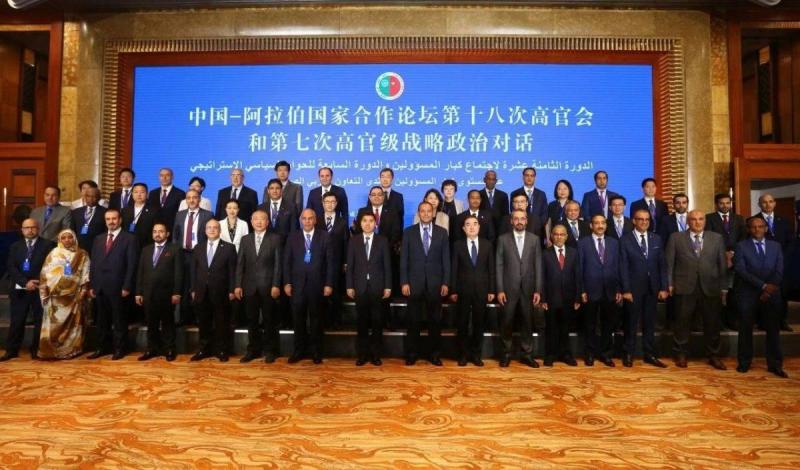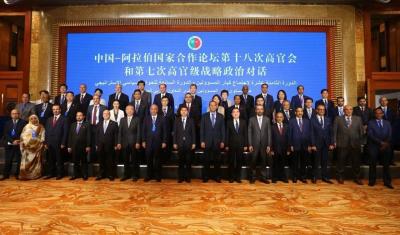Leaders of four Arab countries – Egypt, the United Arab Emirates, Bahrain, and Tunisia – are visiting China this week to attend the China-Arab Cooperation Forum, as announced by the Chinese Foreign Ministry on Monday. This has raised questions about the significance of the high-level Arab presence. The spokesperson for the Chinese Foreign Ministry, Hua Chunying, stated in a press release that the leaders of these countries would conduct "state visits to China and attend the opening of the 10th Ministerial Conference of the China-Arab Cooperation Forum."
Diplomats and specialists in Chinese affairs view the participation of Arab leaders in the China-Arab Cooperation Forum meetings as a message affirming the effort to strengthen relations with China, which, in turn, seeks to engage more with the political issues specific to the Middle East. The Arab delegation includes Egyptian President Abdel Fattah el-Sisi, King of Bahrain Hamad bin Isa Al Khalifa, Tunisian President Kais Saied, and UAE President Sheikh Mohammed bin Zayed Al Nahyan.
Chinese Vice Foreign Minister Ding Li stated in a press conference in Beijing that "Chinese President Xi Jinping will attend the China-Arab Cooperation Forum and deliver a speech tomorrow, Thursday," and that he "will hold discussions with the leaders of the four countries to exchange views on bilateral relations and regional and international issues of common interest."
The high Arab participation in the 10th version of the China-Arab Forum reflects the growing partnership between China and Arab countries in recent years. Former Egyptian Assistant Foreign Minister Ambassador Ezzat Saad interpreted this as noting that "Chinese-Arab relations have seen a leap in recent years since the current Chinese president took office in 2013, especially since he presented a partnership paper to the Arab League in January 2016 covering various areas of cooperation."
Saad listed some of the fruits of this collaboration recently, pointing out that "there are about 12 Arab countries currently maintaining comprehensive strategic partnership relations with China, and Chinese investments in Arab countries are close to $250 billion, with the volume of Chinese trade with Arab countries nearing half a trillion dollars."
The former Egyptian diplomat considered the high-level presence of Arab leaders in China at this time as a "message to the West," reflecting the development of Arab relations with Eastern powers like China and Russia, amid these countries respecting the UN Charter and the rights of peoples to self-determination and non-interference in others' affairs, in contrast to the Western policy based on dual standards.
He cited "the duality in the West's positions on the Ukrainian situation and calls for respect for international pacts, while ignoring them in the case of aggression against Gaza," mentioning that "China's position on the aggression against Gaza aligns with the principles of Chinese foreign policy; China recognizes an independent State of Palestine and has supported the Palestinian position within the UN Security Council and in General Assembly meetings."
China has consistently supported the Palestinian cause and the two-state solution, and recently seeks to gain a role as a mediator in the conflict between "Palestinian resistance" and Israel; as President Xi called in November last year for a "international peace conference" aimed at resolving the conflict.
Asian affairs expert Diaa Helmy from the Egyptian Council for Foreign Affairs notes that there is a "Chinese interest in the region, reflected in its engagement in political issues, seeking to create global balances, in light of the impacts of the aggression against Gaza on the widening scope of conflict in the Middle East and its effect on global trade."
He added, in statements to "Asharq Al-Awsat," that "China aspires to play a role in mediation and helping to make fair and urgent decisions to maintain peace and security in the Middle East, especially since China's stance on the Palestinian cause is balanced and supports legitimate Arab rights."
In November last year, Beijing hosted a meeting of foreign ministers from the Palestinian Authority, Indonesia, Egypt, Saudi Arabia, and Jordan to conduct talks aimed at easing the escalation in the ongoing Israeli-Palestinian conflict.
Helmy concluded that "China's international weight, as the second-largest economy in the world, supports its role in peace and security issues in the region."




